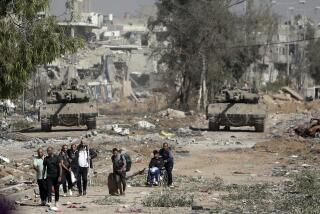Israel May Block Palestinian Balloting in East Jerusalem
- Share via
JERUSALEM — Israeli officials threatened Wednesday to prohibit balloting in East Jerusalem during the Palestinian parliamentary election, a move that Palestinian leaders warned could imperil the Jan. 25 vote and lead to civil unrest.
The Israeli officials said voting probably would not be permitted in Arab neighborhoods that had taken part in previous Palestinian balloting as long as candidates from the Islamic group Hamas compete. Hamas, whose military wing has carried out dozens of suicide bombings and other attacks against Israel during five years of conflict, is running for seats in the Palestinian parliament for the first time.
Israel for months has maintained that Hamas, classified by the United States as a terrorist group, should be kept out of the campaign unless it disarms and disavows violence. Israeli officials said Wednesday that allowing votes to be cast in East Jerusalem was tantamount to helping Hamas achieve power.
“There’s no reason in the world why we should provide the facilities for people to vote for an organization that calls for the destruction of Israel and will undermine the political process,” said Raanan Gissin, spokesman for Israeli Prime Minister Ariel Sharon.
Gissin said Israel would not interfere with balloting in the West Bank. Israel withdrew from the Gaza Strip during the summer.
He said a final decision had not been made on how voters in East Jerusalem might be able to cast their ballots. One idea, Gissin said, would be to allow them to vote instead in nearby Arab neighborhoods in the West Bank.
In Washington, a State Department spokesman downplayed the apparent standoff.
“It is an issue that the Palestinians and the Israelis have worked through before, and I would expect that they would work through once again,” spokesman Sean McCormack said.
Palestinian leaders insist that balloting be held in East Jerusalem, home to about 220,000 Palestinians. Those leaders say the election is an internal matter and that Hamas has a right to run. They rejected a resolution passed by the U.S. House of Representatives last week opposing Hamas’ participation in the election.
Saeb Erekat, the chief Palestinian negotiator, said Palestinian Authority President Mahmoud Abbas was considering how to respond to the East Jerusalem voting ban. Erekat said a decision to cancel or delay the balloting could anger Hamas, which has demanded that the election take place as scheduled, and spark widespread internal chaos.
Erekat said Abbas -- who leads Fatah, Hamas’ chief electoral rival -- would consult with Hamas and other Palestinian parties before deciding whether to postpone.
“This will create more problems than it will solve. This will push Palestinians to the Somalia model: civil war,” Erekat said.
The dispute highlights a broader conflict over East Jerusalem. Israel annexed the area after the 1967 Middle East War, but the Palestinians claim it as their capital of a future state. During elections for Palestinian Authority president in January, Palestinians in East Jerusalem voted by marking absentee ballots in post offices.
Gissin said that arrangement, and a similar one during Palestinian elections in 1996, were exceptions to a ban on political activity in East Jerusalem under an interim peace agreement.
Abbas has been pressured by senior Fatah figures to put off the vote out of concern that Hamas might triumph. Fatah, long the dominant Palestinian movement, is beset by internal rifts and widespread public disenchantment over years of corruption and mismanagement under Yasser Arafat, who died last year.
Last week, a group of the movement’s self-styled young guard defied the Fatah leadership by submitting its own list of candidates.
Abbas has rebuffed calls for a vote delay, but Israeli analysts say he has been waiting for an acceptable reason to postpone in order to blunt Hamas. Although recent polls have shown a hefty margin for Fatah in the race for seats in parliament, Hamas captured municipal elections last week in three large West Bank cities, including a near-sweep in Nablus.
Palestinian analysts say Hamas profited from the disorder inside Fatah and the opportunity for voters to signal their unhappiness with the ruling faction through the local ballot. But Nader Said, a Palestinian pollster at Birzeit University’s Development Studies Program, said many of those voters would return to Fatah once the race took on a national scope.
“People are using the local elections to punish the Palestinian Authority, but they won’t abandon Fatah,” he said in an interview this week.
Meanwhile, a new opinion poll found that half of Israeli respondents favor negotiating with Hamas, if that is needed to make peace with the Palestinians. A slightly smaller share, 47%, were opposed, according to the poll, jointly run by the Harry S. Truman Research Institute for the Advancement of Peace at the Hebrew University of Jerusalem and the Palestinian Center for Policy and Survey Research in the West Bank city of Ramallah.
Last week, a poll by the daily Yediot Aharonot newspaper found Israelis evenly divided on whether Israel should cede East Jerusalem to the Palestinians as part of a peace agreement.
In other developments Wednesday, a wanted Palestinian militant in the West Bank was killed by Israeli troops carrying out a raid in Jenin. The Israeli military said he was sought in connection with the fatal shooting of an Israeli soldier during a raid last month.
The man, identified by Palestinians as Zaid Khalil Moussa, 28, opened fire when soldiers surrounded a house where he was hiding, the army said.
More to Read
Sign up for Essential California
The most important California stories and recommendations in your inbox every morning.
You may occasionally receive promotional content from the Los Angeles Times.










